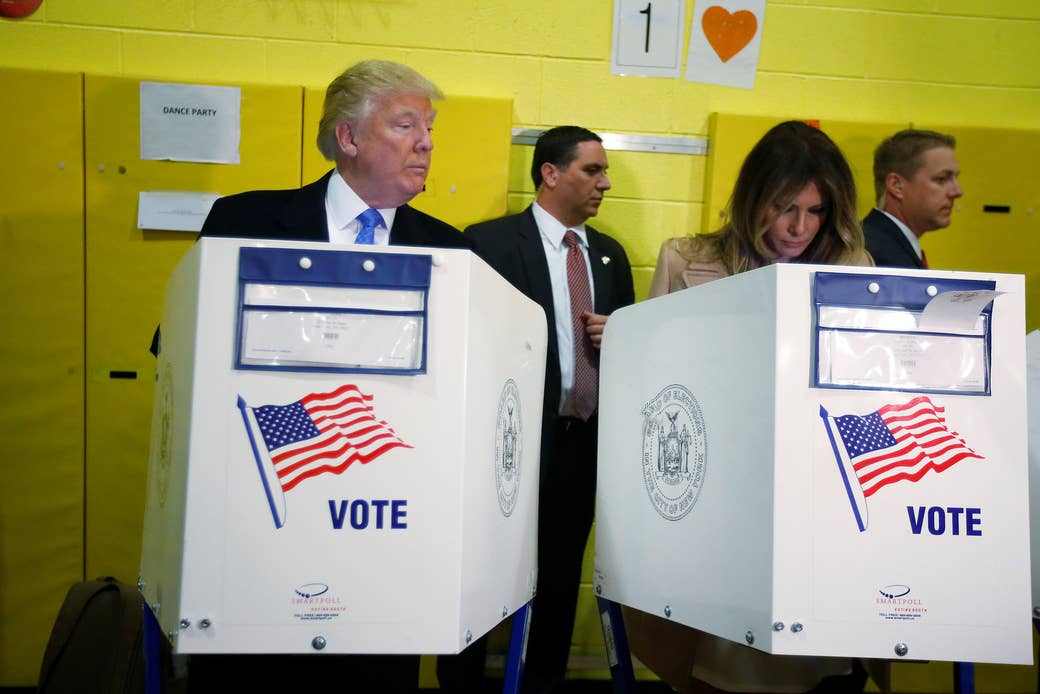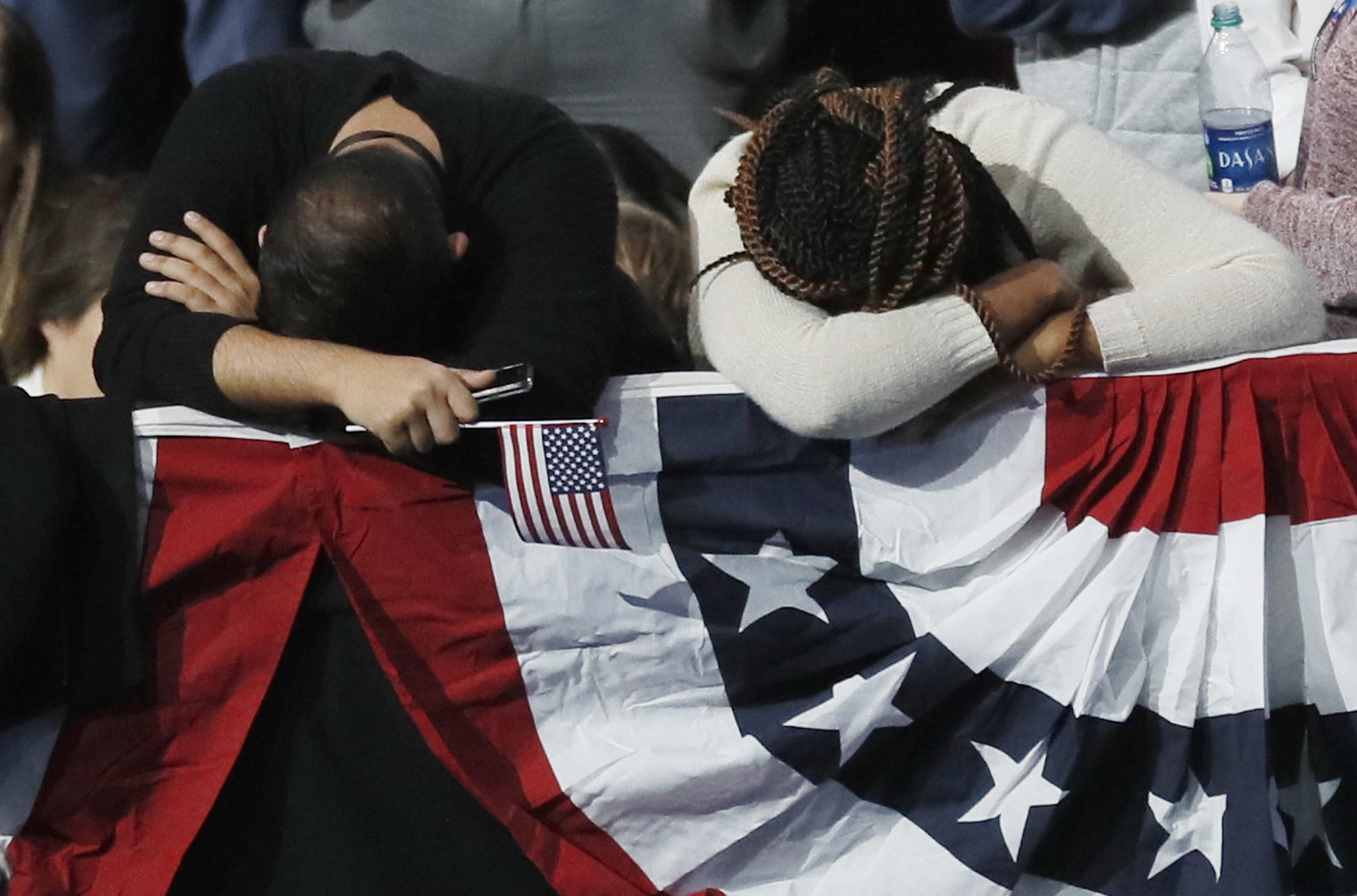
Trump’s win is an endorsement of racism, a validation of bigotry, a confirmation that nearly half of Americans would like a man who does not believe in equal rights, and, at least until he won, the sanctity of the democratic process, to lead our country.
And hovering over all of those beliefs is a stark truth: the way Donald Trump has talked about, allegedly acted toward, and fundamentally conceived of women is the way that the majority of Americans conceive of women. Call it “locker room talk,” call it “just the way it is,” or call it by its true name: misogyny. In electing President Trump, the nation has ratified a backlash that has been gaining slow but terrifying steam just beneath the surface of the recent feminist resurgence.
No matter the endorsements for Hillary from Beyoncé and Rihanna and Katy Perry and Lena Dunham, or the hundreds of thousands of posts in “secret” Hillary support groups, which increasingly feel like tragic melodrama, the underlying fact remains: As a nation, we remain firm in the notion that women should not control their own reproductive health, that men should retain the liberty to judge and touch and control women’s bodies at will, and that the idea of a woman in power neutralizes any concerns over a neo-fascist future of the nation.
Over the last month, I talked to hundreds of female Trump supporters about their candidate’s treatment of women, and the message was always a variation on the same theme: It does not matter. Some women told me that their husbands spoke to them like Trump — that they’d think something was wrong with them if they didn’t. Others suggested that Trump may well be a letch — but that, at age 70, he’d simply run out of the capacity to act on it. One sixtysomething woman told me that getting grabbed was a way for her to know she was still desirable.
Evangelical women said he disgusted them — that he wasn’t Christ-like, that he wasn’t a believer, that he might not even be moral — but they had to vote platform, e.g. anti-abortion. Well-dressed, high-class women in the suburbs underlined that they didn’t believe everything that he said, but they loved Ivanka — whose classiness helped wash the more trashy aftertaste of Trump out their mouths. Whatever their explanations, the underlying fact remained: Trump’s disrespect for women — his evident understanding of them as property or props — simply did not matter. Or, at the very least, did not matter enough.
Trump's disrespect for women — his evident understanding of them as property or props — simply did not matter.
These women, it must be noted, were overwhelmingly white, overwhelmingly straight, and overwhelmingly middle-class. They were not the “working poor” that have so often been singled out as the prototypical Trump supporters. They are the status quo — and, stated or not, they are fundamentally invested in maintaining the status quo, which includes white supremacy.
And part of that status quo is patriarchy: the notion that women will continue to be second-class citizens, subject to men’s understanding of what they should be able to do, touch, and grab when it comes to their bodies — and legislate and punish when it comes to their actions. I’m not suggesting these women have some sort of false consciousness — that they think they’re empowered, and actually aren’t — I’m stating that they fundamentally think disempowerment is okay, so long as they maintain their other (white, straight) sources of privilege. Tavi Gevinson starkly referred to this swath of voters as "white women who hate people of color more than they like having rights to their own bodies." Many women fail to recognize Trump's explicit stances and policies towards people of color and Muslims as "hate," but I know no more appropriate word for what Trump voters have signaled in terms of how non-white, non-Christian, non-straight people should be treated.
That pre-feminist understanding of womanhood has collided with and been exacerbated by the first female major-party candidate for president — a second-wave feminist who has spent her public career inflaming insecurities about what a woman should look, sound, and act like. The hatred that’s accumulated around her can be attributed to many factors — to increased dissatisfaction with political insiders, or rage at the reality of globalism — but the underlying trigger is, at heart, her gender.
It’s not that Clinton’s a soft woman, or even a shrill woman, so much as a sneaky woman: That’s what is at the heart of the investment in her private email server, and the investigation of the Clinton Foundation, and the suspicion that she, along with her confidante Huma Abedin, have conspired to hide a grand, dark — yet ultimately undiscoverable — truth from the American people. For many, that’s the real, if unconscious, fear: that women will take, women have been taking, the reins of power, the keys to the system, the position of the presidency.
At the heart of all of this perceived duplicitousness, after all, is Clinton's unrepentant ambition. It's Clinton's defining character trait: Her understanding of her worth is so strong that she’s refused, at every point in her life and career, to let men define her. When her husband stood on stage at the Democratic National Convention, for example, and recounted when he "met a girl" in 1971, it was ultimately a story of a woman so driven and sure of her value that the former president, a man of similar ambition and intellect, had to find a way to fit into her life, not the other way around.
For Hillary supporters, this approach felt like a clarification of purpose: Yes, many said, this is the type of woman, the type of boldness, the expansiveness of vision we desire. But that approach seems to have backfired, as the constant reminders of Clinton’s intellect, ambition, experience, and self-worth served to stoke the fires burning her effigy. Such attributes are only valued by this country, after all, when they apply to men.
Matriarchy isn’t the fear. Rather, it’s the idea that women will define their own value, and their own futures, on their own terms — instead of by terms men have laid out. Put differently, that each gender, each individual, will have the power to determine their own destiny. To slightly modify the old bumper sticker, it’s the radical notion that both men and women are people.
That’s what Hillary implicitly promised with her candidacy, and that’s what voters have soundly rejected. The articulated ambivalence of many Trump voters varies from “I just couldn’t vote for Hillary,” to “I’m a straight party Republican,” from “He’ll have good advisers,” to “If he raised Ivanka, he can’t be that bad." But the message remains steady: Fear of a female president, and all that she represents, is tenacious enough to neutralize overt bigotry, xenophobia and racism — and manifest misogyny.
In the wake of the election results, a section of Jessica Valenti’s book Sex Object keeps returning to mind: “Given all that women are expected to live with — the leers that start when we’ve barely begun puberty, the harassment, the violence we survive or are constantly on guard for — I can’t help but wonder what it all has done to us,” she wrote. “Not just to how women experience the world, but how we experience ourselves. I started to ask myself: Who would I be if I didn’t live in a world that hated women?”
What might we be? Perhaps women wouldn’t go to college fearing the statistical inevitability of sexual abuse. Perhaps we might be women liberated from the persistence of unequal pay for equal work. And perhaps we might gradually cease to calculate our value based on our ability to regiment our bodies into a highly circumscribed understanding of beauty. Those of us who are nonwhite, queer, fat, disabled, trans, or immigrant might not just be told that we’re equal citizens, but perhaps even experience life as such. Perhaps, if we didn’t live in a world that hated women, we might not live in fear that a male superior will sexually harass us and force us to make a decision between our integrity or our careers.
We might, in other words, experience something like freedom. And from there, the ability to navigate the world in a posture that is not defined by hesitancy and fear.
But for all of that, America has decided, we must wait.

